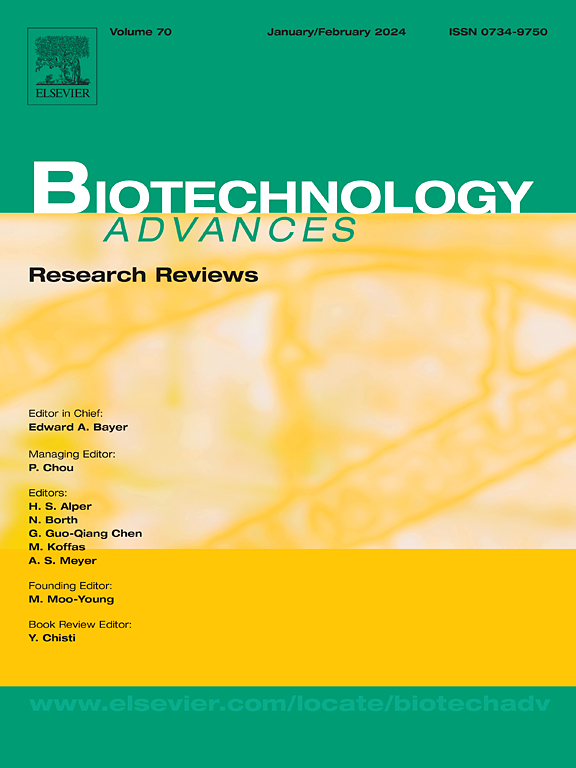噬菌体治疗肺炎克雷伯菌:一个不断发展的观点
IF 12.5
1区 工程技术
Q1 BIOTECHNOLOGY & APPLIED MICROBIOLOGY
引用次数: 0
摘要
肺炎克雷伯菌是最令人担忧的ESKAPE病原体之一,多药耐药菌株推动了噬菌体治疗作为抗生素可行替代方案的迫切临床兴趣。然而,噬菌体和细菌之间的进化军备竞赛使肺炎克雷伯菌具备了复杂的抗噬菌体免疫防御能力,这对持久的治疗成功构成了实质性障碍。通过系统分析肺炎克雷伯菌-噬菌体共同进化动力学,我们确定了主要的耐药机制,并讨论了为什么这些机制主要集中在吸附阻断途径上。然后,我们将临床病例研究与临床前研究结合起来,评估针对噬菌体耐药性的联合策略,特别强调使用抗生素-噬菌体或噬菌体鸡尾酒/噬菌体系列治疗的协同方法,这些方法增加了选择压力,同时降低了细菌宿主的适应性和致病性。最后,我们提出了一个利用机器学习进行噬菌体表征、宿主相互作用预测和从头基因组工程的计算路线图,特别强调最小化耐药性的出现。这项跨学科的综述为合理的噬菌体设计提供了即时的临床指导和前瞻性的愿景,不仅适用于肺炎克雷伯菌,也适用于其他高优先级病原体。我们还强调,合成生物学、计算科学和微生物学的整合对于将噬菌体治疗从实验治疗转变为解决抗菌素耐药性的标准化干预措施至关重要。本文章由计算机程序翻译,如有差异,请以英文原文为准。
Phage therapy against Klebsiella pneumoniae: An evolving perspective
Klebsiella pneumoniae represents one of the most concerning ESKAPE pathogens, with multidrug-resistant strains driving urgent clinical interest in phage therapy as a viable alternative to antibiotics. However, the evolutionary arms race between phages and bacteria has equipped K. pneumoniae with sophisticated anti-phage immune defenses, posing a substantial barrier to durable therapeutic success. Through systematic analysis of K. pneumoniae-phage co-evolutionary dynamics, we identify predominant resistance mechanisms and discuss why these mechanisms primarily concentrate on adsorption blocking pathways. We then integrate clinical case studies with preclinical research to evaluate combination strategies against phage resistance, particularly highlighting synergistic approaches using antibiotics-phage or phage cocktails/phage serial therapy that increase selective pressure while reducing bacterial host adaptability and pathogenicity. Finally, we propose a computational roadmap leveraging machine learning for phage characterization, host-interaction prediction and de novo genome engineering, with particular emphasis on minimizing resistance emergence. This interdisciplinary review provides both immediate clinical guidance and a forward-looking vision for rational phage design, applicable beyond not only to K. pneumoniae but also to other high-priority pathogens. We also highlight that integrations of synthetic biology, computational science, and microbiology will be essential for transitioning phage therapy from experimental treatments to standardized interventions addressing antimicrobial resistance.
求助全文
通过发布文献求助,成功后即可免费获取论文全文。
去求助
来源期刊

Biotechnology advances
工程技术-生物工程与应用微生物
CiteScore
25.50
自引率
2.50%
发文量
167
审稿时长
37 days
期刊介绍:
Biotechnology Advances is a comprehensive review journal that covers all aspects of the multidisciplinary field of biotechnology. The journal focuses on biotechnology principles and their applications in various industries, agriculture, medicine, environmental concerns, and regulatory issues. It publishes authoritative articles that highlight current developments and future trends in the field of biotechnology. The journal invites submissions of manuscripts that are relevant and appropriate. It targets a wide audience, including scientists, engineers, students, instructors, researchers, practitioners, managers, governments, and other stakeholders in the field. Additionally, special issues are published based on selected presentations from recent relevant conferences in collaboration with the organizations hosting those conferences.
 求助内容:
求助内容: 应助结果提醒方式:
应助结果提醒方式:


